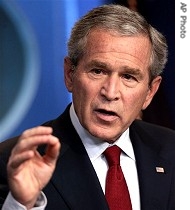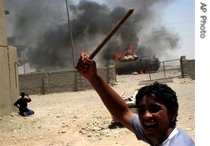-
(单词翻译:双击或拖选)
Pentagon
12 July 2007
President Bush's report to Congress Thursday evaluating progress toward 18 benchmarks of success in Iraq generated immediate1 controversy2, with supporters and opponents of the president's policy seizing on various parts of the report to justify3 their views. VOA Pentagon Correspondent Al Pessin has this look at the report, and at what people on both sides of the issue are saying about it.
 |
| President Bush talks to reporters during press conference, 12 Jul 2007 |
"Those who believe that the battle in Iraq is lost will likely point to the unsatisfactory performance on some of the political benchmarks," said President Bush. "Those of us who believe the battle in Iraq can and must be won see the satisfactory performance on some of the security benchmarks as a cause for optimism."
 |
| An Iraqi youth reacts as a US military's Bradley fighting vehicle bursts into flames in Obeidi, in south east Baghdad, 2 Jul 2007 |
"Even his satisfactory benchmarks fail to demonstrate any real success in Iraq," said Moira Whelan. "The overall message here is that the surge is a complete failure."
Those "satisfactory" Iraqi government benchmarks include forming a committee to evaluate the Iraqi constitution, not allowing the creation of safe havens7 for violent groups, progress on a law to create semi-autonomous regions and providing three combat brigades - about 10,000 troops - to help bring security to Baghdad. But the National Security Network disputes those claims of progress. Ilan Goldenberg is a researcher who put together a what the group calls a fact-checking report on the president's document.
"They brought in three brigades, but the brigades were poorly trained and understaffed, and probably came in at roughly somewhere between 50 and 70 per cent of what they'd actually offered," said Goldenberg. "And there are a lot of news reports about how the Baghdad security operation was behind schedule because of the fact that they didn't have enough people."
Goldenberg and other antiwar activists8 also emphasize the areas where President Bush acknowledged the Iraqi government's performance was not satisfactory. Those include the lack of progress on key laws on sharing oil revenues and easing de-Baathification, failure to end political interference in military decisions, a lack of fairness to the various sectarian groups by law enforcement authorities and a promise to increase the number Iraqi military units capable of operating independently.
Still, supporters of the president stress the difficulty of achieving those goals in the midst of a war, and say his six-month-old new strategy and the one-month-old military offensive should be given more time. Among them is Brian Darling of the Heritage Foundation.
"The president should be given more time," he said. "We're talking about fighting a war and defeating an enemy that is resourceful and could pose a danger to the continental9 United States. So it's important that the president be given time to win the war."
Darling points out that U.S. generals in Iraq say they are making progress and have appealed for more time, and he believes the president is right to listen to them.
Not surprisingly, the same divergent views of the president's report were expressed on Capitol Hill Thursday. In recent weeks, President Bush has lost the support of several senators from his own Republican Party. But others are sticking with him, including Senator Lindsey Graham.
"For two, three years many of us have urged a change in strategy," said Senator Graham. "Well, now we've got one, and it's working. We have made mistakes, but the worst mistake is yet to come. The worst mistake would be to change strategy at a time when it is beginning to show dividends10."
On the Democratic side, Senate Majority Leader Harry11 Reid, who has already said the war has been lost in Iraq, called for another strategy change now, one that would get U.S. troops out of Iraq as quickly as possible.
"It's well past time for a change of course in Iraq," said Senator Reid. "The time to do this is now, not September. We're told good progress is being made. How many times over the last four and a half years have we heard this? Too many to number. Good progress is not being made."
September is when the president's next report is due, and even senior aides acknowledge they will have to show more substantial progress in Iraq by then. If not, they may be hard pressed to prevent Congress from trying to force a withdrawal12 of U.S. troops - a withdrawal that the president and many military officers believe would be premature13, and would lead to disaster for Iraq and possibly a regional war.
 收听单词发音
收听单词发音
1
immediate

|
|
| adj.立即的;直接的,最接近的;紧靠的 | |
参考例句: |
|
|
|
2
controversy

|
|
| n.争论,辩论,争吵 | |
参考例句: |
|
|
|
3
justify

|
|
| vt.证明…正当(或有理),为…辩护 | |
参考例句: |
|
|
|
4
assessment

|
|
| n.评价;评估;对财产的估价,被估定的金额 | |
参考例句: |
|
|
|
5
ongoing

|
|
| adj.进行中的,前进的 | |
参考例句: |
|
|
|
6
activist

|
|
| n.活动分子,积极分子 | |
参考例句: |
|
|
|
7
havens

|
|
| n.港口,安全地方( haven的名词复数 )v.港口,安全地方( haven的第三人称单数 ) | |
参考例句: |
|
|
|
8
activists

|
|
| n.(政治活动的)积极分子,活动家( activist的名词复数 ) | |
参考例句: |
|
|
|
9
continental

|
|
| adj.大陆的,大陆性的,欧洲大陆的 | |
参考例句: |
|
|
|
10
dividends

|
|
| 红利( dividend的名词复数 ); 股息; 被除数; (足球彩票的)彩金 | |
参考例句: |
|
|
|
11
harry

|
|
| vt.掠夺,蹂躏,使苦恼 | |
参考例句: |
|
|
|
12
withdrawal

|
|
| n.取回,提款;撤退,撤军;收回,撤销 | |
参考例句: |
|
|
|
13
premature

|
|
| adj.比预期时间早的;不成熟的,仓促的 | |
参考例句: |
|
|
|















